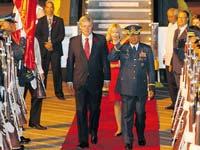“You can bet that China will not be happy”

Canada’s multi-billion deal to boost the military might of the Philippines is likely to inflame relations with Beijing and worsen the tensions in the South China Sea.
“China is likely to view the Canada-Philippines defense agreement as an unfriendly act towards its increasingly aggressive claims in the South China Sea,” said James Soo, a geo-political commentator based in Hong Kong.
“There may be new leadership being groomed in China but there is nothing to indicate that there is a cooling of the escalating tensions in the South China Sea,” he said.
Soo said this new military deal, will pave the way for the Philippines to get better warships and aircraft to patrol its vast shoreline.
“You can bet that China will not be happy with that and you can also bet that they will make their feelings known to Canada,” he said.
The presidential palace in Manila said it is “hoping” the memorandum of agreement signed by the Philippines and Canada for defense-building will not worsen the tension between the Philippines and China over a territorial dispute in the West Philippine Sea.
The Philippines and Canada last weekend signed the memorandum on trade, investments defense and military-related procurements worth $12.6 billion, witnessed by President Benigno Aquino III and Canadian Prime Minister Stephen Harper.
Aquino said the MOU between the Philippine Department of National Defense and the Canadian Commercial Corporation “will help us in our efforts to build our defense and security capabilities.”
“We have a lot of outmoded equipment,” Aquino said, noting the Philippines has only 132 ships – most of them dating back to World War II – that have to patrol 36,000 km of coastline.
He added that in terms of aircraft, the Philippines has “not a... single fighter” in its inventory.
The MOU seeks to ensure expeditious procurement transactions with the Canadian government’s assurance on the quality of equipment from and compliance with procurement contracts by Canadian companies.
China claims virtually all of the South China Sea as its own, even waters close to the coasts of other Asian countries, like Philippines, Vietnam and Malaysia, in an area that is believed to sit atop vast oil and gas resources, making it one of Asia’s potential military flashpoints.
China and the Philippines have had vessels stationed at Scarborough Shoal for more than a month in an effort to assert their sovereignty over the area.
The shoal sits about 230 kilometres (140 miles) from the Philippines’ main island of Luzon and 1,200 kilometres northwest from the nearest major Chinese land mass,
Another of the areas being contested is the Spratlys, a chain of up to 190 islands, reefs, coral outcrops. Citing the Spratly’s as ancient Chinese fishing grounds found in a vague reference in mythological maps, the Chinese Communist Party (CCP) set up military stations on the uninhabited island group under the guise of fishing outposts and lighthouses.
Last week China claimed new territory less than 50 miles (80 kilometres) from a Philippine province, boosting tensions over potentially resource-rich areas of the South China Sea.
The Philippines recently acquired a Hamilton-class cutter from the United States Coast Guard and another one is set to be delivered this year. The government also announced it would buy five patrol boats from France for around $116 million.
Harper, the highest ranking Canadian official to visit the country in 15 years, said the agreement would allow the Philippines to source equipment and expertise from Canadian defense contractors, like Bombardier Aerospace, de Havilland Canada and Irving Shipbuilding.
Aside from defense and security ties, Harper said Canada will make further investments in the Philippines over the next three years “with implementation assistance from the Asia Development Bank.”
Also part of his delegation was Canada Minister for International Trade Ed Fast, Minister for Natural Resources Joseph Oliver, Senator Tobias Enverga Jr., who is the first Filipino-Canadian senator, and 10 Filipino-Canadian community leaders.
Canada is one of the most active trading partners of the Philippines and more than 800,000 Filipinos work and live in Canada.
Harper also announced that Canada would provide $10 million over the next five years to promote the rights of women in the Philippines and seven other Southeast Asian countries.
Leave a comment









